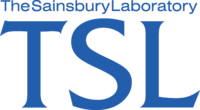Sainsbury Laboratory
 | |
| Abbreviation | TSL |
|---|---|
| Formation | 1988 |
| Type | Research institute |
| Headquarters | Norwich, UK |
Key people | |
| Affiliations | University of East Anglia |
| Website |
tsl |
The Sainsbury Laboratory (TSL) is a research institute located at the Norwich Research Park (NRP) in Norwich, Norfolk, England, that carries out fundamental biological research and technology development on aspects of plant disease, plant disease resistance and microbial symbiosis in plants.
Research
Fundamental research
At present there are six TSL research groups concentrating on several key areas of fundamental research, each headed by a single group leader.
- Receptor kinase-mediated innate immunity in plants – Prof. Cyril Zipfel
- Interactions between plants and pathogens, notably the Irish potato famine organism and the rice and wheat blast fungus – Prof. Sophien Kamoun
- How plants resist plant pathogens, and how pathogens suppress resistance – Prof. Jonathan Jones
- The role of membrane-bound intracellular compartments in the communication between plants and pathogens – Prof. Silke Robatzek
- Understanding the genetic architecture underlying non-host resistance – Dr Matthew Moscou
- Translational research leveraging the advanced understanding of molecular host-pathogen interactions at TSL to deliver new solutions against relevant plant diseases – Dr Peter van Esse
Technology development
The four core technology teams of TSL develop new technologies to enhance TSL research and provide direct expert support and guidance to the other groups of TSL.
- Bioinformatics – Dr Dan MacLean
- Proteomics – Dr Frank Menke
- Synthetic Biology – Mark Youles
- Tissue Culture and Transformation – Matthew Smoker
TSL+
The TSL+ programme encompasses projects within any group with a more direct applied aspect, in many cases building on discoveries that have arisen from the fundamental work in the lab. TSL commits core resources to projects that aim directly to reduce crop losses to important diseases. The Two Blades Foundation funds a research group within TSL that focuses solely on work that falls under this program.
Facilities
TSL provides its researchers access to compute clusters, mass spectrometers, confocal high content screening microscopy and plant growth and transformation facilities.
Training
TSL provides a training environment with the intention of preparing post-graduate students, post-doctoral scientists and early career project leaders to excel in their careers. This includes training from the expert technology groups in bioinformatics and computational biology, proteomics and synthetic biology as well as mentoring from established scientists.
Notable discoveries
Groundbreaking work that has arisen from the Laboratory includes the cloning of the first of the receptor-like protein class of plant resistance genes and the discovery of small interfering RNA (siRNA), the specificity determinant in RNA-mediated gene silencing.
Establishment
In the mid-1980s the trustees of the Gatsby Charitable Foundation (Gatsby) decided to establish a laboratory to investigate plant interactions with microbes and viruses, using state-of-the-art genetics and molecular biology techniques. The UK already had considerable expertise in this area, and the topic presented opportunity for work on a large number of questions with fundamental significance in biology, and good prospects that any discoveries might be usefully applied. An agreement was signed in 1987, setting up the Laboratory as a joint venture between Gatsby, the John Innes Foundation (JIF), the University of East Anglia (UEA) and the Agricultural and Food Research Council. The current laboratory building was constructed at the John Innes Centre and occupied in 1989. Although it is a separate legal entity, the Laboratory participates fully in the life of the John Innes Centre and the University of East Anglia.
Funding
The Gatsby Charitable Foundation provide around 50% of funding for The Sainsbury Laboratory,[1] with the remainder coming from competitive BBSRC and European Research Council grants.[2]